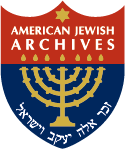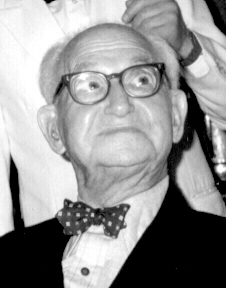TABLE OF CONTENTS
Series A. Miscellaneous Correspondence and Papers. 1945-1994.

A Finding Aid to the Albert J. Amateau Papers. 1937-1995.
Manuscript Collection No. 604
Introduction |
|
| Repository: | The Jacob Rader Marcus Center of the American Jewish Archives |
| Creator: | Amateu, Albert J. |
| Title: | Albert J. Amateau Papers |
| Dates: | 1937-1995 |
| Quantity: | 1.2 linear feet; (3 Hollinger boxes) |
| Abstract: | The Albert J. Amateau Papers describe the life of Albert J. Amateau as social worker, lawyer, businessman, author, advocate for Sephardic Jewry and a lifelong defender of his Turkish homeland. The collection includes correspondence, a transcript of an oral history interview, autobiographical notes, writings, and materials regarding Palestine and Portugal. |
| Identification: | MS-604 |
| Language: | Collection material in English. |
Biographical Sketch

Albert Jean Amateau was born on April 20, 1889, in Milas, Turkey; one in a family of six Sephardic brothers and sisters. He grew up in rural Ottoman Turkey, the son of a French-Turkish lawyer. Albert's father had been born in Turkey, during the period when Albert's grandfather served as the French consul in Izmir, Turkey.
In 1908 Amateau began studies at the University of Istanbul Law School, graduating in June 1910. While at the university Albert taught night classes for illiterate adults. His status as a teacher exempted him from military service. But as a result of thre "Young Turks" revolution of 1908, the Turkish government changed the law in 1910 and he was expected to serve in the military. Since he did not wish to serve because he believed he would be killed, he decided to leave the country. Not having any money and afraid to contact his father, he had to persuade the captain of a French steamer to take him as far as Naples. He worked in Naples for three months as a dishwasher to make enough money to travel to the United States. He finally arrived in New York in August, 1910.
For the first few years in New York, Amateau worked at a succession of odd jobs, including teaching English and operation of automobiles to new immigrants. In 1913 he began working for the Society of the Welfare of the Jewish Deaf as a social worker assisting deaf Jews to acquire jobs. He had previously (1910-1911) worked in a similar capicity for the Industrial Removal Office.
In 1916 Amateau volunteered for the United States Army and served in World War I until 1918. While he was Europe, he was wounded. After he returned from the Army, Amateau was ordained in 1920 at the Jewish Theological Seminary, and he became the first rabbi of a congregation of the deaf. He continued working for the Society for the Welfare of the Jewish Deaf until 1925 when he quit to found an import-export business. For the next 10 years he worked as a lawyer for Travelers Insurance Company in New York. In 1938 he was named Area Director for the Federal Wages and Hours Administration.
In 1940 he moved to Los Angeles and in 1941 started the Albert J. Amateau Foreign Language Service, a service providing translators for lipsync dubbing for the motion picture industry. The business continued in operation until at least 1989.
Amateau had a strong love for his homeland of Turkey. He was given an award by the Assembly of Turkish-American Associations, for his constant defense of Turkey while living in the United States. He wrote numerous letters in response to anti-Turkish references brought to his attention. He also worked hard to try to disprove accusations by Armenians against the Turkish during the days of the Ottoman Empire. In 1992, he helped found the American Society of Jewish Friends of Turkey and was named as its president.
In 1937, Amateau assisted with negotiations between Jews and Arabs of Palestine.
Amateau was instrumental in organizing Sephardic immigrants, organizing the First Sephardic Democratic Club in New York. He was a member and often leader of several other organizations: Brotherhood of Rhodes (New York), Sephardic Brotherhood (New York), National Organization of Jewish Social Workers, Masons and Rotary International.
On July 5, 1914, Amateau married his childhood sweethart from Izmir, Turkey, Rebecca (Bekita) Nahum; she died in February 1976. In 1923 Albert and Bekita had a son, Rodney. On November 17, 1976, Albert married Edith nee Martin.
Amateau died at his home in Santa Rosa, California on February 6, 1996 at 106 years old.
Scope and Content Note
The Albert J. Amateau Collection describes the life of Albert J. Amateau as social worker, lawyer, businessman, author, advocate for Sephardic Jewry and a lifelong defender of his Turkish homeland. The collection includes correspondence, a transcript of an oral history interview, autobiographical notes, writings, and materials regarding Palestine and Portugal.
Arrangement
This collection is arranged in 2 series:
- Series A. Correspondence and Papers. 1945-1994.
- Series B. Biographical Information. 1937-1991.
Conditions of Access and Use
Terms of Access and Use
The Albert J. Amateau Papers are open to all users. The original manuscript collection is available in the reading room of the Jacob Rader Marcus Center of the American Jewish Archives.
Property and Literary Rights
Edith Amateau, by the act of donating the Albert J. Amateau Papers to the American Jewish Archives, assigned all property rights to the American Jewish Archives. Literary rights to materials authored by Albert J. Amateau are held by the American Jewish Archives. Literary rights may also be retained by specific creators of materials.
Questions concerning rights should be addressed to the Executive Director of the American Jewish Archives. For more information see the American Jewish Archives copyright information webpage.
Administrative Information
Preferred Citation
Footnotes and bibliographic references should refer to the Albert J. Amateau Papers and the American Jewish Archives. A suggestion for at least the first citation is as follows:
[Description and dates], Box #, Folder #. MS-604. Albert J. Amateau Papers. American Jewish Archives, Cincinnati, Ohio.
Provenance
The Albert J. Amateau Papers were received from Edith Amateau, Santa Rosa, California, July 1996.
Processing Information
Processed by Kevin Proffitt and Joseph Greer, May, 1998.
Box and Folder Listing
| Series A. Miscellaneous Correspondence and Papers. 1945-1994. | |||||||||||
| Arrangement Note: The Miscellaneous Correspondence and Papers series is divided into two subseries: Subseries 1. Miscellaneous Correspondence and Papers on Turkish Jewry and Subseries 2. Correspondence and Papers. | |||||||||||
| Subseries 1. Miscellaneous Correspondence and Papers on Turkish Jewry. 1945-1994. | |||||||||||
| Scope and Content Note: Subseries 1. Miscellaneous Correspondence and Papers on Turkish Jewry consists of one Hollinger box of correspondence and miscellaneous papers. The major subject of the materials is Amateau's defense of Turkish Jewry. The materials in this subseries span the years 1945-1995. | |||||||||||
| Arrangement Note: This subseries is roughly arranged in chronological order. | |||||||||||
| Box | Folder | ||||||||||
| 1 | 1 | Correspondence and papers. 1988-1994 | |||||||||
| 1 | 2 | Correspondence and papers. 1989-1993. | |||||||||
| 1 | 3 | Correspondence and papers. 1988-1993. | |||||||||
| 1 | 4 | Correspondence and papers. 1988-1993. | |||||||||
| 1 | 5 | Correspondence and papers. 1945-1993. | |||||||||
| 1 | 6 | Correspondence and papers. 1988-1993. | |||||||||
| Box | Folder | ||||||||||
| 2 | 1 | Correspondence and papers. 1988-1992. | |||||||||
| Subseries 2. Correspondence and Papers. 1986-1994. | |||||||||||
| Scope and Content Note: Subseries 2. Correspondence and Papers consists of one Hollinger box of correspondence and miscellaneous papers. The materials in this subseries span the years 1986-1994. | |||||||||||
| This subseries includes correspondence with Louis Levy, founder and president of the American Association of Jewish Friends of Turkey; correspondence with Jose A. Nesssim, who was President of the Sephardic Education Center in Jerusalem; and correspondence with Jacob M. Ott, who was the senior rabbi at Sephardic Temple Tifereth Israel in Los Angeles. | |||||||||||
| Arrangement Note: This subseries is arranged alphabetically. | |||||||||||
| Box | Folder | ||||||||||
| 2 | 2 | American Association of Jewish Friends of Turkey. 1989. | |||||||||
| 2 | 3 | Assembly of Turkish American Associations. 1986-1990. | |||||||||
| 2 | 4 | Ciprut, Michael. 1987. | |||||||||
| 2 | 5 | de Vidas, Albert. 1926-1993. | |||||||||
| 2 | 6 | Erman, Nihat B.1988-1989. | |||||||||
| 2 | 7 | Jerusalmi, Isaac1990-1994. | |||||||||
| 2 | 8 | Kuzay, Tuncer M.1987-1989. | |||||||||
| 2 | 9 | Levy, Louis N.1988-1994 . | |||||||||
| 2 | 10 | Maselin, Simon J.1988. | |||||||||
| 2 | 11 | Nessim, Jose A..1989-1990. | |||||||||
| 2 | 12 | Ott, Jacob M.1990-1994. | |||||||||
| 2 | 13 | Peck, Abraham J.1988-1994. | |||||||||
| Series B. Biographical Information. 1937-1991. | |||||||||||
| Scope and Content Note: The Biographical Information series consists of one Hollinger box containing a transcript of an oral history interview, autobiographical notes, writings and materials on Palestine and Portugal. The material in this series spans the years 1937-1991. | |||||||||||
| Box | Folder | ||||||||||
| 3 | 1 | "The Americanization of a Sephardic Turk" [Oral history interview]. 1986. | |||||||||
| 3 | 2 | Autobiographical notes. 1991. | |||||||||
| 3 | 3 | "David v. the Mighty Goliaths He Conquered". 1968. | |||||||||
| 3 | 4 | Palestine. 1937-1938. | |||||||||
| 3 | 5 | Portuguese diary.1945-1955. | |||||||||
Search Terms
The following terms have been used to index the description of this collection in the AJA Online Catalog.